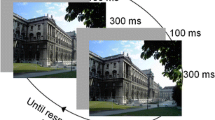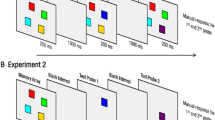Abstract
People often fail to detect a change between two visual scenes and retrieval failure has been suggested as a reason. We investigated the possibility that retrieval blocking underlies this failure by examining the error pattern in recognizing the pre-change object. The results of Experiment 1 showed that participants were biased toward selecting the lure that was similar to the post-change object when they failed to recognize the pre-change object. This bias was also observed in Experiment 2 when there was sufficient time to encode and consolidate the pre-change object and the bias was as strong as correct recognition in Experiment 3 when participants divided attention during encoding and comparison. The bias in memory error remained significant even when participants had the option to select an “I don’t remember” response in Experiment 4. In Experiment 5, the bias was observed after participants successfully detected a change at an invalidly cued location and after they failed to detect a change at a validly cued location. These findings suggest that blocking can lead to retrieval failure in change detection when participants are aware of a change yet unable to retrieve verbatim traces and also when participants are unaware of a change and use the post-change object to retrieve the identity of the previous object at the same location.

Similar content being viewed by others
References
Agresti, A. (1996). An introduction to categorical data analysis. New York: Wiley.
Anderson, J. R. (1983). A spreading activation theory of memory. Journal of Verbal Learning and Verbal Behavior, 22, 261–295.
Anderson, M. C., & Spellman, B. A. (1995). On the status of inhibitory mechanisms in cognition: Memory retrieval as a modal case. Psychological Review, 102, 68–100.
Angelone, B. L., Levin, D. T., & Simons, D. J. (2003). The roles of representation and comparison failures in change blindness. Perception, 32, 947–962.
Beck, M. R., & Levin, D. T. (2003). The role of representational volatility in recognizing pre- and post-change objects. Perception & Psychophysics, 65, 458–468.
Beck, M. R., Peterson, M. S., & Angelone, B. L. (2007). The roles of encoding, retrieval, and awareness in change detection. Memory & Cognition, 34, 610–620.
Bjork, R. A. (1989). Retrieval inhibition as an adaptive mechanism in human memory. In: H. L. Roediger, & F. I. M. Craik (Eds.) Varieties of memory and consciousness: essays in Honour of Endel Tulving (pp. 309–330). Hillsdale: Lawrence Erlbaum Associates.
Brainerd, C. J., & Reyna, V. F. (1996). Mere memory testing creates false memories in children. Developmental Psychology, 32, 467–478.
Brainerd, C. J., & Reyna, V. F. (1998). Fuzzy-trace theory and false memory: New frontiers. Journal of Experimental Child Psychology, 71, 194–209.
Brainerd, C. J., Wright, R., Reyna, V. F., & Payne, D. G. (2002). Dual-retrieval processes in free and associative recall. Journal of Memory and Language, 46, 120–152.
CorelDRAW! [Computer Software]. (1994). Ottawa: Corel, Inc.
Hollingworth, A. (2003). Failures of retrieval and comparison constrain change detection in natural scenes. Journal of Experimental Psychology: Human Perception and Performance, 29, 388–403.
Hollingworth, A. (2005). The relationship between online visual representation of a scene and long-term scene memory. Journal of Experimental Psychology: Learning, Memory, and Cognition, 31, 396–411.
Hollingworth, A., Williams, C. C., & Henderson, J. M. (2001). To see and remember: Visually specific information is retained in memory from previously attended objects in natural scenes. Psychonomic Bulletin & Review, 8, 761–768.
Hopfinger, J. B., & Mangun, G. R. (1998). Reflexive attention modulates processing of visual stimuli in human extrastriate cortex. Psychological Science, 9, 441–447.
Koch, K., Wagner, G., von Consbruch, K., Nenadic, I., Schultz, C., & Ehle, C., et al. (2006). Temporal changes in neural activation during practice of information retrieval from short-term memory: an fMRI study. Brain Research, 1107, 140–150.
Libby, L. K., Neisser, U. (2001). Structure and strategy in the associative false memory paradigm. Memory, 9, 145–163.
Lyle, K. B., & Johnson, M. K. (2006). Importing perceived features into false memories. Memory, 14, 197–213.
MacLeod, C. M. (1989). Directed forgetting affects both direct and indirect tests of memory. Journal of Experimental Psychology: Learning, Memory, and Cognition, 15, 13–21.
Mäntylä, T., & Sundström, A. (2004). Changing scenes: Memory for naturalistic events following change blindness. Memory, 12, 696–706.
Miller, M. B., & Gazzaniga, M. S. (1998). Creating false memories for visual scenes. Neuropsychologia, 36, 513–520.
Mitchell, K. J., Johnson, M. K., Raye, C. L., & Greene, E. J. (2004). Prefrontal cortex activity associated with source monitoring in a working memory task. Journal of Cognitive Neuroscience, 16, 921–934.
Mitroff, S. R., Simons, D. J., & Levin, D. T. (2004). Nothing compares 2 views: Change blindness results from failures to compare retained information. Perception & Psychophysics, 66, 1268–1281.
Noe, A., & O'Regan, J. K. (2000). Perception, attention and the grand illusion. Psyche: an Interdisciplinary Journal of Research on Consciousness, 6.
Nyberg, L., Forkstam, C., Petersson, K. M., Cabeza, R., & Ingvar, M. (2002). Brain imaging of human memory systems: Between-systems similarities and within-system differences. Cognitive Brain Research, 13, 281–292.
Pé rez-Mata, M. N., Read, J. D., & Diges, M. (2002). Effects of divided attention and word concreteness on correct recall and false memory reports. Memory, 10, 161–177.
Potter, M. C. (1976). Short-term conceptual memory for pictures. Journal of Experimental Psychology: Human Learning and Memory, 2, 509–522.
Raaijmakers, J. G. W., & Shiffrin, R. M. (1981). Search of associative memory. Psychological Review, 88, 93–134.
Rensink, R. A. (2000). Seeing, sensing, and scrutinizing. Vision Research, 40, 1469–1487.
Roediger, H. L., & McDermott, K. B. (1995). Creating false memories: Remembering words not presented in lists. Journal of Experimental Psychology: Learning, Memory, & Cognition, 21, 803–814.
Roediger, H. L., Stellon, C. C., & Tulving, E. (1977). Inhibition from part-list cues and rate of recall. Journal of Experimental Psychology: Human Learning and Memory, 2, 174–188.
Ryan, J. D., & Cohen, N. J. (2004). The nature of change detection and online representations of scenes. Journal of Experimental Psychology: Human Perception and Performance, 30, 988–1015.
Scott-Brown, K. C., Baker, M. R., & Orbach, H. S. (2000). Comparison blindness. Visual Cognition, 7, 254–267.
Schacter, D. L. (2001). The seven sins of memory: How the mind forgets and remembers. New York: Houghton Mifflin Company.
Schmidt, B. K., Vogel, E. K., Woodman, G. F., & Luck, S. J. (2002). Voluntary and automatic attentional control of visual working memory. Perception & Psychophysics, 64, 754–763.
Schneider, W., Eschman, A., & Zuccolotto, A. (2002). E-Prime user’s guide. Pittsburgh: Psychology Software Tools Inc.
Silverman, M. E., & Mack, A. (2006). Change blindness and priming: When it does and does not occur. Consciousness and Cognition, 15, 409–422.
Simons, D. J. (2000). Current approaches to change blindness. Visual Cognition, 7, 1–15.
Simons, D. J., & Rensink, R. A. (2005). Change blindness: Past, present, and future. Trends in Cognitive Sciences, 9, 16–20.
Simons, D. J., Chabris, C. F., Schnur, T., & Levin, D. T. (2002). Evidence for preserved representations in change blindness. Consciousness and Cognition, 11, 78–97.
Yantis, S., & Jonides, J. (1984). Abrupt visual onsets and selective attention: evidence from visual search. Journal of Experimental Psychology: Human perception & performance, 10, 601–621.
Yeh, Y.-Y., & Yang, C.-T. (2008). Object memory and change detection: Dissociation as a function of visual and conceptual similarity. Acta Psychologica, 127, 114–128.
Acknowledgments
This study was supported by grants (NSC95-2413-H-002-003, NSC96-2413-H-007-MY3) from the National Science Council. Parts of this work were presented in November 2005 at the 46th Annual Meeting of the Psychonomic Society, Toronto, Canada. We thank Y.-C. Tseng for her assistance on data collection. We thank anonymous reviewers for suggesting the addition of the “I don’t remember” choice and the possibility of unequal attention to the pre- and post-change objects.
Author information
Authors and Affiliations
Corresponding author
Rights and permissions
About this article
Cite this article
Yang, CT., Yeh, YY. Memory error in recognizing a pre-change object. Psychological Research 73, 75–88 (2009). https://doi.org/10.1007/s00426-008-0134-x
Received:
Accepted:
Published:
Issue Date:
DOI: https://doi.org/10.1007/s00426-008-0134-x




